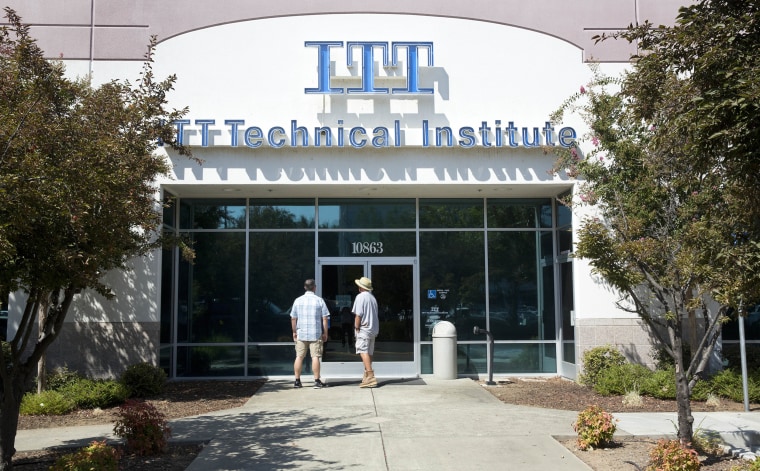The messy collapse of ITT Educational Services Inc.’s nationwide network of technical schools — triggered earlier this month when the U.S. Department of Education (DOE) cut off ITT’s access to hundreds of millions in annual federal subsidies — has left many American taxpayers wondering how the government and one of the nation’s largest for-profit education systems reached this juncture.
An ongoing dispute over the criminal justice program at ITT's Tallahassee, Florida campus offers a glimpse into a system where taxpayer dollars have supported a network of trade schools widely criticized for deceptive recruitment practices and an often low-quality education. It also provides some indication of how ITT survived years of scrutiny, withering criticism and a growing raft of lawsuits before shutting down.
Critics say that Tallahassee campus administrators and recruiters sought to diligently protect their school from legal liability, while simultaneously seducing prospective students with outsized verbal recruitment promises.
Yet in response to multiple requests, ITT provided NBC News with mandatory disclosure forms and other documentation that seem to explicitly inform prospective students of the potential limits of an ITT degree.The DOE’s action against ITT Tech earlier this month is independent of multiple lawsuits and state investigations into ITT’s recruitment practices, including a lawsuit filed in April by Massachusetts Attorney General Maura Healey.
“These students were exploited and pressured to enroll with the promise of great careers and high salaries, but were instead left unable to repay their loans and support their families,” Healey said in an April statement.
The ‘CSI’ Pitch
The total cost of tuition and other fees to complete the Associate degree in Criminology and Forensic Technology at ITT for the 2014/2015 school year ranged between $45,000 and $49,000, according to ITT, though many ITT students’ tuitions were largely subsidized with federal loans and grants.
According to a half dozen former administrators and students from the Tallahassee campus, recruiters there lured scores of prospective students into the school’s criminal justice program with promises that they could land jobs as crime scene investigators like those on “CSI Miami” and other popular police procedurals.
“They would tell the kids, ‘Have you ever seen CSI Miami? ... Well, if you want to be a CSI you should take our program,’” said Rodney Lipscomb, dean of academic affairs at the Tallahassee campus from 2011 to 2015.
“They made promises of being able to get these kids crime scene investigator jobs. Students were signing up left and right because they could take the program for two years and be crime scene investigators.”
Lipscomb, who filed a federal whistleblower lawsuit against ITT Tech after being dismissed from his position in 2015, said he was furious when he learned about the practices.

“There’s no way that any student with an associate’s degree was going to get a job like that. That requires chemistry, that requires biology,” he said.
Kysha Fedd, the ITT criminal justice department chair until she quit in 2012 over what she said were deceptive recruiting practices, recalled being incensed when she learned about the “CSI” pitch.
“I had students tell me that, and that that was how they were advertising and pitching it to the students,” said Fedd, who was also working as a Gadsden County Sheriff’s deputy.
“Of course, I went to one of the recruiters and asked him, ‘What is it that you’re telling students?’ He said, ‘We don’t tell them anything. We let them make their minds up,’” Fedd recalled.
“And I said, ‘But what exactly are they telling them, so I am aware? I have students coming in with criminal records, with felonies on their records, and so I need to know what you’re telling them.”
Fedd said many of her students were not aware, for instance, that a criminal record could seriously curtail their law enforcement job prospects.
“As soon as I started talking to students, I recognized that some of them had felony records — which was a red flag to me — and I didn’t want to be taking these students’ money.”
When she returned from the recruitment office to face her students, she said she had to recalibrate their expectations.
“I told them, ‘“I’m not saying you won’t [get a CSI job], but that won’t be the job you’ll get when you get out of here. You’re not going to go straight into that field. Students were shocked. They were saying ‘that’s why I was in the program!'”
Fedd said at least some of her graduates ended up with jobs, but not the kind they expected.
“A security guard — that was the biggest prospective job they would have. And some not even security guards. One was working at a photo lab, and another was at a cleaning service. It was a lot of deceptive methods they were using that I did not like at all.”
Shannon Gibson, an adjunct professor in the program from 2010 to 2013 said she was also shocked by the “CSI” pitch, and later quit her job.
“I think what they did was wrong — promising people that are not going to get these jobs — especially the people who have to pay out of pocket,” Gibson said. “For a lot of these students there, this was their last chance to get a quality education ... I had one student that I knew was sleeping behind a dumpster and then coming to school ... But they make [the program] look so easy in the ads.”
“Heart-wrenching Process” of Closing Schools
An ITT spokeswoman said in a series of email responses to NBC News queries that the school system’s current focus is the “complicated and heart-wrenching process of closing our academic institutions after approximately 50 years.” She characterized charges of deceptive “CSI” pitches — first reported by Dow Jones MarketWatch in January — as unproven.
The lawsuit was unsealed in January after the U.S. Department of Justice declined to join Lipscomb in the complaint. ITT has previously denied the allegations in the lawsuit, and in a motion filed late last month lawyers for the company asked a federal judge to dismiss the case entirely.
“Regurgitating unproven allegations as a means to justify this horrific end is disgraceful,” spokeswoman Nicole Elam wrote in the email.
Elam provided NBC News with what she describes as release forms that every incoming student to an ITT criminal justice program must sign before enrolling.
Click Here to See the Release Form
The release requires students to “acknowledge that I have been informed by ITT Technical Institute that graduates of a Criminal Justice program offered by ITT ... may not qualify for a career in law enforcement involving employment as a police officer, or agent by federal, state, county, local or municipal authorities.”
The form instructs students interested in a law enforcement career to “contact the applicable government authority” prior to enrollment to determine what additional qualifications a graduate must meet “to be eligible for employment” in law enforcement.
The document goes on to say that such qualifications may include the lack of a criminal record, a valid driver’s license and U.S. citizenship.

Yet the half dozen former students and administrators each said in separate interviews that the recruiters’ “CSI” pitches misled dozens and dozens of Tallahassee students.
One administrator provided NBC News with what she said was a screen grab from ITT’s online description of its criminal justice program, which was taken down last week when the company announced it would be closing its campuses.
Click Here to See the Screen Grab
The language included the assertion that “TV shows like CSI, Criminal Minds, NCIS and Bones has brought the field of criminology and forensic technology to new levels of awareness and curiosity,” and said the program is “designed to help students prepare for entry-level positions in the field of criminal justice.”
Elam declined to address a copy of the screen grab sent to her by NBC News.
'Substandard Degrees'
Another key point of contention among critics of the Tallahassee campus is the allegation that ITT engaged in deceptive or misleading recruitment practices about its accreditation.
Students and administrators said that many undergraduates felt misled by recruiters who they say verbally indicated that they could transfer ITT credits to other schools.
Independent experts in for-profit education quality say degrees from some for-profit schools are often useless in seeking employment, because — like ITT — the schools are only accredited nationally, not regionally.
The standards and quality requirements for regional accreditation are far more rigorous, appeal to employers and allow for the transfer of credits between different regionally accredited institutions.
“Degrees from for-profit colleges are viewed by many employers as substandard,” said Robert Shireman, a senior fellow at The Century Foundation and a specialist in for-profit education policy.
The difference between national and regional accreditation can be confusing to many students, according to Alexis Goldstein, a senior policy analyst at the non-profit Americans for Financial Reform who studies for-profit education.
“Employers are not interested in schools that are not regionally-accredited, and students feel that they were betrayed when they were told that their for-profit school was accredited,” Goldstein said. “As a student, you hear that a school is nationally accredited and you don’t know [what that means] and so you say, ‘that sounds great.’”
The experts pointed to recent studies published in the National Bureau of Economic Research which found that students who graduate from for-profit schools with associate’s and bachelor’s degrees actually make less money than they did prior to attending college.
Yet in a statement on its website ITT provides students with a list of trade schools that it says may accept ITT transfer credit. And even before it closed its campuses, ITT’s website noted explicitly that “it is unlikely that any credits earned at the school will be transferable to or accepted by any institution.”
Elam also noted in one response to NBC News that “[a]ll students, at enrollment, must sign multiple disclosures about their programs of study — including disclosures on accreditation and graduate salaries.”
For Shagidrika Mathis, a U.S. Army vet who signed up for ITT’s Tallahassee criminal justice program in 2012, the entire process was a frustrating exercise in futility that cost her precious time and money.
“Using an ITT degree to actually get a job in the field of criminal justice? It was just a huge flop,” she said.
Mathis said she was almost finished with her ITT degree when she went to talk to an adviser there about transferring her credits to Florida State University, a regionally accredited, non-profit state school.
She said that she was told when she signed up that she would be able to transfer her credits to a four-year school, but that wasn’t the case.
Mathis said she ended up at Colorado Technical University, a for-profit which is regionally accredited.
“I had to do the [criminal justice] program all over again” at the Colorado school, she said.
Shireman said that he’s familiar with administrative balancing acts between verbal assurances and explicit but contradictory documentation.
“It certainly is common among predatory schools,” he said. “They attempt to protect themselves by getting you to sign a document that says, “Oh, I understand that no promises have been made to me, and at the same time hiring recruiters who connect to [the student] emotionally, and use that connection to make you believe that this school is the key to your future and it will get you a job and that the degree will be meaningful.
“Whether all of that would technically be found in court to be fraud? There’s a good chance it will, despite [a student] signing these documents, but even if it doesn’t, it’s sleazy. Taxpayers shouldn’t be supporting sleazy colleges whether they’re outright lying, or just manipulative.”
